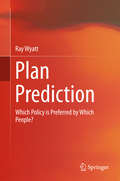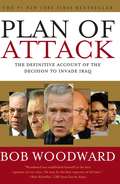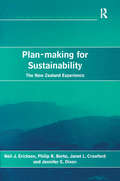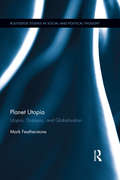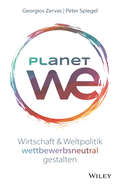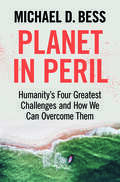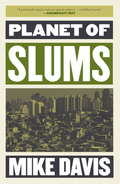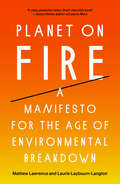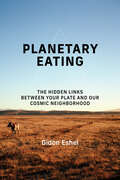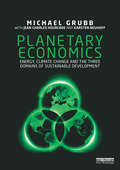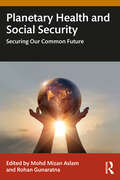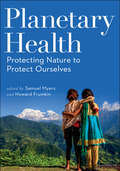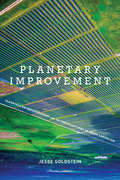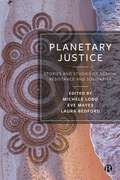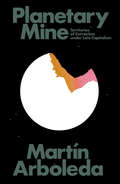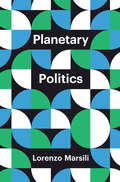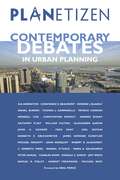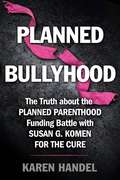- Table View
- List View
Plan Equis
by Lina MeruaneFlash publica un relato inédito de Lina Meruane, en tiempos de cambio en el horizonte político chileno. En el Chile contemporáneo, una madre de derechas y una hija de izquierdas hablan sobre la grieta política que ha vertebrado al país desde el golpe militar de 1973. En una discusión de gran intensidad, la hija, profesora universitaria reivindicativa y locuaz, se enfrenta a la madre conservadora y clasista que todavía cree en las falsas verdades proclamadas por la dictadura. Lina Meruane, una de las más brillantes narradoras de la actualidad, revisita sin artificios el pasado reciente chileno, marcado por un legado allendista que hoy parece más vivo que nunca. Sus páginas examinan el coste humano y moral de la intervención estadounidense en suelo latinoamericano, el olvidado protagonismo político de las mujeres de la derecha chilena, el privilegio de clase, la división acaso insalvable entre generaciones, la memoriay el duelo. Plan Equis no solo es el retrato de una y tantas familias chilenas quebradas por la ideología, es también la descripción exacta de la ternura, de los miedos y odios que subyacen a los afectos. «Lina Meruane, cuya prosa se resiste a los usos heredados, es una escritora inteligente, autocrítica, que sabe adelantarse a objeciones. Me quito el sombrero ante ella».Marta Sanz «La prosa de Lina Meruane posee una fuerte potencia literaria: surge de los martillazos de la conciencia, pero también de lo inasible y del dolor».Roberto Bolaño De Sangre en el ojo se dijo: «Este libro es la puerta de entrada a un mundo repleto de historias, la llave de acceso a una sociedad cerrada, el pasaporte a una galería de personajes extravagantes y estrafalarios. Este libro es un clásico contemporáneo».Claudio López Lamadrid «Una novela de genio y de perturbadora inteligencia».Enrique Vila-Matas
Plan Prediction
by Ray WyattThis book develops an innovative system, in the form of an "app", that harnesses the power of the internet to predict which sorts of people will prefer which policy in ANY planning situation. It chronicles the accumulated research wisdom behind the system's reasoning, along with several less successful approaches to policy making that have been found wanting in the past - including the myth, usually peddled by strategic planners, that it is possible to find a "best" plan which optimally satisfies everybody. The book lays out an entirely new kind of Planning Support System (PSS). It will facilitate decision-making that is far more community-sensitive than previously, and it will drastically improve the performance of anyone who needs to plan within socially-sensitive contexts - which is all of us. A standout feature of the system is its commitment to "scientific rigour", as shown by its predicted plan scores always being graphically presented within error margins so that true statistical significance is instantly observable. Moreover, the probabilities that its predictions are correct are always shown - a refreshing change from most, if not all other Decision Support Systems (DSS) that simply expect users to accept their outputs on faith alone.
Plan of Attack (Bush at War, Part II)
by Bob WoodwardPlan of Attack is the definitive account of how and why President George W. Bush, his war council, and allies launched a preemptive attack to topple Saddam Hussein and occupy Iraq. Bob Woodward's latest landmark account of Washington decision making provides an original, authoritative narrative of behind-the-scenes maneuvering over two years, examining the causes and consequences of the most controversial war since Vietnam. Based on interviews with 75 key participants and more than three and a half hours of exclusive interviews with President Bush, Plan of Attack is part presidential history charting the decisions made during 16 critical months; part military history revealing precise details and the evolution of the Top Secret war planning under the restricted codeword Polo Step; and part a harrowing spy story as the CIA dispatches a covert paramilitary team into northern Iraq six months before the start of the war. This team recruited 87 Iraqi spies designated with the cryptonym DB/ROCKSTARS, one of whom turned over the personnel files of all 6,000 men in Saddam Hussein's personal security organization. What emerges are astonishingly intimate portraits: President Bush in war cabinet meetings in the White House Situation Room and the Oval Office, and in private conversation; Dick Cheney, the focused and driven vice president; Colin Powell, the conflicted and cautious secretary of state; Donald Rumsfeld, the controlling war technocrat; George Tenet, the activist CIA director; Tommy Franks, the profane and demanding general; Condoleezza Rice, the ever-present referee and national security adviser; Karl Rove, the hands-on political strategist; other key members of the White House staff and congressional leadership; and foreign leaders ranging from British Prime Minister Blair to Russian President Putin. Plan of Attack provides new details on the intelligence assessments of Iraq's alleged weapons of mass destruction and the planning for the war's aftermath.
Plan-making for Sustainability: The New Zealand Experience (Urban Planning and Environment)
by Neil J. Ericksen Philip R. Berke Jennifer E. DixonAround the introduction of Agenda 21 at Rio in 1991, some countries like the Netherlands and New Zealand were already leading the way with quite innovative approaches to environmental planning. Focusing on the New Zealand government's innovations in sustainable and environmental planning, particularly the Resource Management Act of 1991, this book highlights planning and governance under devolved and co-operative mandates. It uses multiple methods to evaluate the quality of policy statements and district plans prepared by regional and local councils respectively, as well as the various inter- and intra-organizational and institutional factors affecting them. It also analyses the quality of the plans' implementation through the consensus or permits process, and the quality of the environmental outcomes.
Planes: A novel
by Peter C BakerAn urgent, fiercely intelligent debut novel about "two couples, an ocean apart—one wounded by a war crime, the other just starting to reckon with being implicated in it.... An insightful book about the slow, zigzag work of healing that nonetheless moves at the speed of a thriller" (Caleb Crain, author of Necessary Errors).For years, Amira—a recent convert to Islam living in Rome—has gone to work, said her prayers, and struggled to piece together her husband&’s redacted letters from the Moroccan black site where he is imprisoned. She moves as inconspicuously as possible through her modest life, doing her best to avoid the whispered curiosity of her community. Meanwhile, Mel—once an activist—is trying to get the suburban conservatives of her small North Carolina town to support her school board initiatives, and struggles to fill her empty nest. It's a steady, settled life, except perhaps for the affair she can't admit she's having. As these narratives unfurl thousands of miles apart, they begin to resonate like the two sides of a tuning fork. And when Mel learns that a local charter airline serves as a front for the CIA&’s extraordinary renditions—including that of Amira's husband—both women face wrenching questions that will shape the rest of their lives. Written with piercing insight and artistry, Planes is a singular, assured, and indelible first novel that announces a major new voice.
Planet Canada: How Our Expats Are Shaping the Future
by John StackhouseA leading thinker on Canada's place in the world contends that our country's greatest untapped resource may bethe three million Canadians who don't live here.Entrepreneurs, educators, humanitarians: an entire province's worth of Canadian citizens live outside Canada. Some will return, others won't. But what they all share is the ability, and often the desire, to export Canadian values to a world sorely in need of them. And to act as ambassadors for Canada in industries and societies where diplomatic efforts find little traction. Surely a country with people as diverse as Canada's ought to plug itself into every corner of the globe. We don't, and sometimes not even when our expats are eager to help.Failing to put this desire to work, contends bestselling author and longtime foreign correspondent John Stackhouse, is a grave error for a small country whose voice is getting lost behind developing nations of rapidly increasing influence. The soft power we once boasted is getting softer, but we have an unparalleled resource, if we choose to use it. To ensure Canada's place in the world, Stackhouse argues in Planet Canada, we need this exceptional province of expats and their special claim on the twenty-first century.
Planet Earth, The Future
by Fergus Beeley Jonathan Porritt Rosamund Kidman CoxPlanet Earth is the most spectacular look at our planet that has ever been broadcast. It has made millions of viewers aware of the breathtaking beauty and variety of life on our planet, and just as importantly how fragile that life can be. The premise of Planet Earth - The Future is to identify environmental and conservation issues that surround some of the sequences in Planet Earth, and put these issues to leading commentators, including NGO's, politicians and religious leaders James Leape (WWF International), Jeffrey McNeely (World Conservation Union), and the Archbishop of Canterbury to name but a few of the 35 contributors. We are living in destructive times, and our responsibility for the planet's stewardship is something none of us can afford to ignore. Comprised of transcripts from the series interviews, thoughtfully edited and abbreviated, this compelling and insightful book serves as a timely reminder of what needs to be done and what can be done to keep Planet Earth alive.
Planet India: How the Fastest Growing Democracy Is Transforming America and the World
by Mira KamdarIndia is everywhere: on magazine covers and cinema marquees, at the gym and in the kitchen, in corporate boardrooms and on Capitol Hill. Through incisive reportage and illuminating analysis, Mira Kamdar explores India's astonishing transformation from a developing country into a global powerhouse. She takes us inside India, reporting on the people, companies, and policies defining the new India and revealing how it will profoundly affect our future -- financially, culturally, politically. <p><p> The world's fastest-growing democracy, India has the youngest population on the planet, and a middle class as big as the population of the entire United States. Its market has the potential to become the world's largest. As one film producer told Kamdar when they met in New York, "Who needs the American audience? There are only 300 million people here." Not only is India the ideal market for the next new thing, but with a highly skilled English-speaking workforce, elite educational institutions, and growing foreign investment, India is emerging as an innovator of the technology that is driving the next phase of the global economy. <p> While India is celebrating its meteoric rise, it is also racing against time to bring the benefits of the twenty-first century to the 800 million Indians who live on less than two dollars per day, to find the sustainable energy to fuel its explosive economic growth, and to navigate international and domestic politics to ensure India's security and its status as a global power. India is the world in microcosm: the challenges it faces are universal -- from combating terrorism, poverty, and disease to protecting the environment and creating jobs. The urgency of these challenges for India is spurring innovative solutions, which will catapult it to the top of the new world order. If India succeeds, it will not only save itself, it will save us all. If it fails, we will all suffer. As goes India, so goes the world. <p> Mira Kamdar tells the dramatic story of a nation in the midst of redefining itself and our world. Provocative, timely, and essential, Planet India is the groundbreaking book that will convince Americans just how high the stakes are -- what there is to lose, and what there is to gain from India's meteoric rise.
Planet Utopia: Utopia, Dystopia, and Globalisation (Routledge Studies in Social and Political Thought)
by Mark FeatherstoneThe key figure of the capitalist utopia is the individual who is ultimately free. The capitalist’s ideal society is designed to protect this freedom. However, within Planet Utopia: Utopia, Dystopia, Globalisation, Featherstone argues that capitalist utopian vision, which is most clearly expressed in theories of global finance, is no longer sustainable today. This book concerns the status of utopian thinking in contemporary global society and the possibility of imagining alternative ways of living outside of capitalism. Using a range of sociological and philosophical theories to write the first intellectual history of the capitalist utopia in English, Featherstone provokes the reader into thinking about ways of moving beyond this model of organising social life through sociological modes of thought. Indeed, this enlightening volume seeks to show how utopian thinking about the way people should live has been progressively captured by capitalism with the result that it is difficult to imagine alternatives to capitalist society today. Presenting sociology and sociological thinking as a utopian alternative to the capitalist utopia, Planet Utopia will appeal to postgraduate and postdoctoral students interested in subjects including Sociology, Social Theory, Cultural Studies, Cultural Theory and Continental Philosophy.
Planet We: Wirtschaft und Weltpolitik wettbewerbsneutral gestalten
by Peter Spiegel Georgios ZervasWas nützen noch so wichtige und richtige Forderungen, wenn deren Umsetzungen fortlaufend unfassbar lähmen - selbst bei unverkennbar existenziellen Bedrohungen? Gibt es keinen Weg, wie Klima-, Bildungs-, soziale, wirtschaftliche, politische und sonstige notwendige Wenden zügig angepackt und effektiv umgesetzt werden können? Die Antwort ist so einfach wie spektakulär hoffnungsstiftend: Selbst ausgesprochen kühne Handlungskonzepte stellen selbst für die Wirtschaft absolut kein Problem dar, wenn sie eine Voraussetzung erfüllen, ein Prinzip beachten: wenn sie wettbewerbsneutral sind. Wettbewerbsneutrale Lösungen sind per se Win-win-win-Lösungen und geben uns genau deshalb effektive Handlungsfähigkeit zurück. Sie bereiten den Weg zu einer Transformation der heutigen Wett-Wirtschaft zu einer blühenden öko-sozial nachhaltigen "Planet We Economy". Dieses Buch erläutert das Prinzip der Wettbewerbsneutralität - und wendet es an auf die großen Gestaltungshebel von öko-sozialen Standards bis hin zur lokalen bis globalen Steuer-, Bildungs- und Innovationspolitik an. Der renommierte Club of Budapest, eine internationale Vereinigung, die sich der Entwicklung einer neuen Denkweise und einer neuen Ethik verschrieben hat, die zur Lösung der sozialen, politischen, wirtschaftlichen und ökologischen Herausforderungen des 21. Jahrhunderts beitragen, hat sich entschieden, das Buch als "Report an den Club of Budapest" anzunehmen! "Das Buch verdient die Lektüre von allen, die für eine bessere Welt wirken möchten." (Prof. Dr. Dr. Ervin Laszlo, Gründer und Präsident des Club of Budapest International, im Vorwort zum Buch)
Planet in Peril Planetary Dangers: Humanity's Four Greatest Challenges and How We Can Overcome Them
by Michael D. BessWritten by an award-winning historian of science and technology, Planet in Peril describes the top four mega-dangers facing humankind – climate change, nukes, pandemics, and artificial intelligence. It outlines the solutions that have been tried, and analyzes why they have thus far fallen short. These four existential dangers present a special kind of challenge that urgently requires planet-level responses, yet today's international institutions have so far failed to meet this need. The book lays out a realistic pathway for gradually modifying the United Nations over the coming century so that it can become more effective at coordinating global solutions to humanity's problems. Neither optimistic nor pessimistic, but pragmatic and constructive, the book explores how to move past ideological polarization and global political fragmentation. Unafraid to take intellectual risks, Planet in Peril sketches a plausible roadmap toward a safer, more democratic future for us all.
Planet of Slums
by Mike DavisAccordingto the united nations, more than one billion people now live in theslums of the cities of the South. In this brilliant and ambitious book,Mike Davis explores the future of a radically unequal and explosivelyunstable urban world. From the sprawling barricadas ofLima to the garbage hills of Manila, urbanization has been disconnectedfrom industrialization, and even from economic growth. Davis portrays a vasthumanity warehoused in shantytowns and exiled from the formal worldeconomy. He argues that the rise of this informal urban proletariat isa wholly unforeseen development, and asks whether the great slums, as a terrified Victorian middle class onceimagined, are volcanoes waiting to erupt.
Planet on Fire: A Manifesto for the Age of Environmental Breakdown
by Mathew Lawrence Laurie Laybourn-LangtonA radical manifesto for how to deal with environmental breakdownIn the age of environmental breakdown, breakdown, the political status quo has no answer to the devastating and inequitably distributed consequences of the climate emergency. We urgently need an alternative to bring about the rapid transformation of our social and economic systems. As we rebuild our lives in the wake of Covid-19 and face the challenges of ecological disaster, how can the left win a world fit for life? Planet on Fire is an urgent manifesto for a fundamental reimagining of the global economy. It offers a clear and practical road map for a future that is democratic and sustainable by design. Laurie Laybourn-Langton and Mathew Lawrence argue that it is not enough merely to spend our way out of the crisis; we must also rapidly reshape the economy to create a new way of life that can foster a healthy and flourishing environment for all. Planet on Fire offers a detailed and achievable manifesto for a new politics capable of tackling environmental breakdown.
Planetary Eating: The Hidden Links between Your Plate and Our Cosmic Neighborhood
by Gidon EshelA scientifically rigorous guide to making the best dietary choices for both our personal health and our environmental footprint.Many of us try our best to eat foods that are healthy and environmentally sustainable. But are we getting it right? Which foods amount to &“wise&” choices, and which ones are best avoided? Common views often range widely and are sometimes even contradictory. It&’s most unfortunate when conscientious individuals who go to great lengths in their quest to minimize environmental impacts follow the wrong advice. In Planetary Eating, Gidon Eshel aims to minimize such misuse of good will by providing scientifically untrained readers with the tools needed to make the best choices for themselves and for our planet.Eshel writes that dietary choices, and the corresponding agricultural patterns, are, for most of us, our principal form of planetary agency—the main ways by which we impact our overburdened and undernourished host planet. Agriculture and diet are therefore most productively examined through the planetary science perspective. Starting from rather basic (but not quite first) principles, Planetary Eating offers impartial, fact-based analysis with firm foundations in earth and planetary sciences on how to make the right dietary choices.
Planetary Economics: Energy, climate change and the three domains of sustainable development
by Michael GrubbHow well do our assumptions about the global challenges of energy, environment and economic development fit the facts? Energy prices have varied hugely between countries and over time, yet the share of national income spent on energy has remained surprisingly constant. The foundational theories of economic growth account for only about half the growth observed in practice. Despite escalating warnings for more than two decades about the planetary risks of rising greenhouse gas emissions, most governments have seemed powerless to change course. Planetary Economics shows the surprising links between these seemingly unconnected facts. It argues that tackling the energy and environmental problems of the 21st Century requires three different domains of decision-making to be recognised and connected. Each domain involves different theoretical foundations, draws on different areas of evidence, and implies different policies. The book shows that the transformation of energy systems involves all three domains - and each is equally important. From them flow three pillars of policy – three quite distinct kinds of actions that need to be taken, which rest on fundamentally different principles. Any pillar on its own will fail. Only by understanding all three, and fitting them together, do we have any hope of changing course. And if we do, the oft-assumed conflict between economy and the environment dissolves – with potential for benefits to both. Planetary Economics charts how.
Planetary Health and Social Security: Securing Our Common Future
by Rohan GunaratnaOffering an in-depth exploration of the security challenges posed by COVID-19, Gunaratna, Aslam, and their contributors present a comprehensive collection of thematic and country-specific analyses on post-pandemic planetary health strategies. This book critically evaluates the global challenges and responses to COVID-19, examining its impact across key sectors such as security, defense, trade, health, economy, and religion. Through empirical evidence and diverse case studies, it analyzes the strengths and shortcomings of international efforts and offers thoughtful approaches and solutions to fostering a balanced and resilient planet for future generations. Essential for students and scholars of planetary health, international relations, humanitarian affairs, strategic and defense management, policy studies, and global health, this book also serves as a valuable resource for policymakers, government ministries, and agencies seeking insights into effective global practices.
Planetary Health: Protecting Nature to Protect Ourselves
by Howard Frumkin Samuel MyersHuman health depends on the health of the planet. Earth's natural systems—the air, the water, the biodiversity, the climate—are our life support systems. Yet climate change, biodiversity loss, scarcity of land and freshwater, pollution and other threats are degrading these systems. The emerging field of planetary health aims to understand how these changes threaten our health and how to protect ourselves and the rest of the biosphere.Planetary Health: Protecting Nature to Protect Ourselves provides a readable introduction to this new paradigm. With an interdisciplinary approach, the book addresses a wide range of health impacts felt in the Anthropocene, including food and nutrition, infectious disease, non-communicable disease, dislocation and conflict, and mental health. It also presents strategies to combat environmental changes and its ill-effects, such as controlling toxic exposures, investing in clean energy, improving urban design, and more. Chapters are authored by widely recognized experts.The result is a comprehensive and optimistic overview of a growing field that is being adopted by researchers and universities around the world. Students of public health will gain a solid grounding in the new challenges their profession must confront, while those in the environmental sciences, agriculture, the design professions, and other fields will become familiar with the human consequences of planetary changes. Understanding how our changing environment affects our health is increasingly critical to a variety of disciplines and professions. Planetary Health is the definitive guide to this vital field.
Planetary Hinterlands: Extraction, Abandonment and Care (Palgrave Studies in Globalization, Culture and Society)
by Sarah Nuttall Hanneke Stuit Esther Peeren Pamila GuptaThis open access book considers the concept of the hinterland as a crucial tool for understanding the global and planetary present as a time defined by the lasting legacies of colonialism, increasing labor precarity under late capitalist regimes, and looming climate disasters. Traditionally seen to serve a (colonial) port or market town, the hinterland here becomes a lens to attend to the times and spaces shaped and experienced across the received categories of the urban, rural, wilderness or nature. In straddling these categories, the concept of the hinterland foregrounds the human and more-than-human lively processes and forms of care that go on even in sites defined by capitalist extraction and political abandonment. Bringing together scholars from the humanities and social sciences, the book rethinks hinterland materialities, affectivities, and ecologies across places and cultural imaginations, Global North and South, urban and rural, and land and water.
Planetary Improvement: Cleantech Entrepreneurship and the Contradictions of Green Capitalism (The\mit Press Ser.)
by Jesse GoldsteinAn examination of clean technology entrepreneurship finds that “green capitalism” is more capitalist than green.Entrepreneurs and investors in the green economy have encouraged a vision of addressing climate change with new technologies. In Planetary Improvement, Jesse Goldstein examines the cleantech entrepreneurial community in order to understand the limitations of environmental transformation within a capitalist system. Reporting on a series of investment pitches by cleantech entrepreneurs in New York City, Goldstein describes investor-friendly visions of incremental improvements to the industrial status quo that are hardly transformational. He explores a new “green spirit of capitalism,” a discourse of planetary improvement, that aims to “save the planet” by looking for “non-disruptive disruptions,” technologies that deliver “solutions” without changing much of what causes the underlying problems in the first place.Goldstein charts the rise of business environmentalism over the last half of the twentieth century and examines cleantech's unspoken assumptions of continuing cheap and abundant energy. Recounting the sometimes conflicting motivations of cleantech entrepreneurs and investors, he argues that the cleantech innovation ecosystem and its Schumpetarian dynamic of creative destruction are built around attempts to control creativity by demanding that transformational aspirations give way to short-term financial concerns. As a result, capitalist imperatives capture and stifle visions of sociotechnical possibility and transformation. Finally, he calls for a green spirit that goes beyond capitalism, in which sociotechnical experimentation is able to break free from the narrow bonds and relative privilege of cleantech entrepreneurs and the investors that control their fate.
Planetary Justice: Stories and Studies of Action, Resistance and Solidarity
by Michele LoboAvailable open access digitally under CC-BY-NC-ND licence. Bringing together interdisciplinary climate change scholarship and grassroots activism, this book considers the possibilities of planetary justice across human difference, generations, species and the concept of life and non-life. Writing amidst bushfires, cyclones, global climate strikes and a global pandemic, contributors from the Earth Unbound Collective share stories from India, Australia, Canada and Scotland. Chapters draw on Indigenous, Black, Southern, ecosocialist and ecofeminist perspectives to call for more radical and interconnected ideas of justice and solidarity. This accessible book features diverse voices that speak with the planet in the face of climate change, biodiversity loss and extinction. It explores the politics and practices of working towards a future where the planet thrives.
Planetary Mine: Territories of Extraction under Late Capitalism
by Martin ArboledaA clarion call to rethink natural resource extraction beyond the extractive industriesPlanetary Mine rethinks the politics and territoriality of resource extraction, especially as the mining industry becomes reorganized in the form of logistical networks, and East Asian economies emerge as the new pivot of the capitalist world-system. Through an exploration of the ways in which mines in the Atacama Desert of Chile—the driest in the world—have become intermingled with an expanding constellation of megacities, ports, banks, and factories across East Asia, the book rethinks uneven geographical development in the era of supply chain capitalism. Arguing that extraction entails much more than the mere spatiality of mine shafts and pits, Planetary Mine points towards the expanding webs of infrastructure, of labor, of finance, and of struggle, that drive resource-based industries in the twenty-first century.
Planetary Politics: A Manifesto (Theory Redux)
by Lorenzo MarsiliThe global crisis of our time involves a complex of ecological, economic, technological and migratory challenges that no state is able to control. The result is a provincialisation of our democracies with respect to the new planetary powers confronting humanity. It is from this that our increasingly impotent and rabid politics stems. Paradoxical as it may seem, it is precisely the decline of the nation-state that is the source of the great nationalist uprising of our time.We need a new planetary vision that is able to reclaim and liberate our world, starting today and engaging each of us. This is the task of philosophy as much as it is of politics, of theory as it is of activism. Connecting with a new generation taking to the streets across the globe, this book tells the story of the ever-closer union of our world, from the age of empire to the climate crisis, and presents a plea and a roadmap to step beyond the mental and material boundaries of our nations.
Planetizen's Contemporary Debates in Urban Planning
by Abhijeet Chavan Christian Peralta Christopher Steins Abhijeet PlanetizenPlanetizen's Contemporary Debates in Urban Planning is a fascinating review of major topics and issues discussed in the field of urban planning, assembled by editors at Planetizen, the leading source of news and information for the planning and development community on the web. The book brings together a wide range of editorial and discussion topics, coupled with commentary and overviews to create an enlightening record of the continuously evolving philosophy of building and managing cities. The book's contributors include the most well-known experts in the planning and design fields, among them James Howard Kunstler, Alex Garvin, Andres Duany, Joel Kotkin, and Wendell Cox. These and other prominent thinkers offer passionate debates and thought-provoking commentary on the most important and controversial topics in the field of urban planning and design: gentrification, eminent domain, the philosophical divide between the Smart Growth community, libertarians and New Urbanists, regional growth patterns, urban design trends, transportation systems, and reaction to disasters such as Katrina and 9/11 that changed the way we look at cities and security. Planetizen's Contemporary Debates in Urban Planning provides readers with a unique and accessible introduction to a broad array of ideas and perspectives. With the increasing awareness of the need for sound urban planning to ensure the economic, environmental, and social health of modern society, Planetizen's Contemporary Debates in Urban Planning gives professionals in the field and concerned citizens alike a deeper understanding of the critical, complex issues that continue to challenge urban planners, designers, and developers.
Planned Bullyhood
by Karen HandelThe full, up-close story of the battle between Susan G. Komen for the Cure and Planned Parenthood from the woman at the center of the explosive media firestorm of early 2012, Karen Handel, former SVP of Public Policy at Komen.
Planner's Estimating Guide: Projecting Land-Use and Facility Needs
by Arthur NelsonThe United States faces enormous changes in the next 25 years. Arthur C. (Chris) Nelson starts this book with a few projections: The population will grow by one-third to 375 million. We will need 60 million new housing units to house these people. There will be 60 percent more jobs, requiring 50 billion additional square feet of nonresidential space. The bottom line is that half of all development in 2030 will have been built since 2000. Nelson estimates the cost of new construction alone to be at least $20 trillion. This book gives planning practitioners a powerful tool to help decide where to put this new development. It does not advocate one development scenario over another, but it revolutionizes the job of estimating land-use and facility needs. Planner's Estimating Guide offers easy-to-use formulas and worksheets that are formatted in an Excel workbook on CD-ROM and carefully explained in the text. They make it easy to figure future requirements for countless scenarios. The workbook and text deal with a 20-year planning horizon for a fictitious county, but both the time projection and scale are entirely adaptable to myriad local circumstances. The program allows you to gather a first impression of future land-use needs, and revise it to reflect local limitations. For example, if the landscape in question won't support the land-use estimations, change the assumptions in the workbook to devise new estimates. The workbook shows the implications of growth based on standard assumptions; you can change the assumptions as needed to reflect local conditions — including public input — to see how outcomes change. Use the workbook as a model for testing local sensitivities with respect to land supply constraints and changes in policy assumptions. The results won't tell you what to do, but will reveal the numerical implications of different scenarios. The book is written principally for practitioners, and also for planning students as a primary or supplementary text. Used creatively, the powerful tools in Planner's Estimating Guide will help you determine the numerical implications of an almost infinite number of future circumstances that may affect your community.

